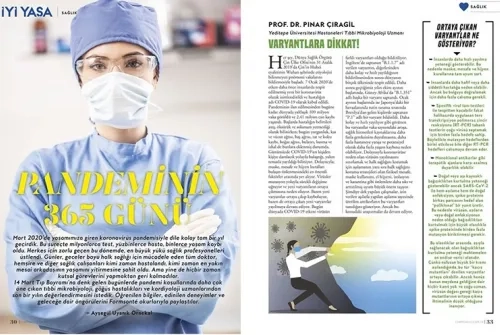Alo Yeditepe
Alo Yeditepe
Covid-19 Variants
Yeditepe University Hospitals Medical Microbiology Specialist Prof. Dr. Pınar Çıragil gave the following information about Covid-19 Variants:
Coronaviruses (CoV) are a large family of viruses that cause diseases ranging from the common cold to more serious diseases such as Middle East Respiratory Syndrome (MERS-CoV) and Severe Acute Respiratory Syndrome (SARS-CoV). The spectrum of diseases caused by a coronavirus in humans can vary from the common cold to severe acute respiratory syndrome.
Subtypes of coronaviruses circulating in humans (HCoV-229E, HCoV-OC43, HCoV-NL63, and HKU1-CoV) are viruses that mostly cause the common cold.
After the Office of World Health Organization (WHO) in China reported cases of pneumonia of unknown etiology in the city of Wuhan, China's Hubei province on 31 December 2019, the agent was named a new Coronavirus SARS-CoV-2, which has not been detected in humans before, on 7 January 2020, and the name of the disease was accepted as COVID-19. Since the declaration of the pandemic, approximately 109 million cases have been seen in the world and 2.41 million lives have been lost to date.
While the symptoms of COVID-19 were known as fever, cough, and respiratory failure at the beginning of the pandemic, fatigue, muscle and body aches, headache, loss of taste and smell, sore throat, nausea - vomiting, and diarrhea were added to these symptoms afterward.
Today, it is known that COVID-19 disease is transmitted from person to person through droplets and spreads through close contact. For this reason, compliance with mask, distance, and hygiene rules is the most important factor in preventing transmission.
Viruses undergo constant change through mutation and cause the emergence of new variants. Sometimes new variants appear and disappear, and sometimes new variants that emerge continue to spread.
Today, it has been reported that there are different variants of the virus that causes COVID-19 in the world. It was detected in many countries of the world after it was reported that the variant named "B.1.1.7", which was detected in England, spread more easily and faster than other variants. Then, in early October last year, another variant named “B.1.351” was detected in South Africa. In early January, a variant called “P.1” was reported, which was detected in people arriving from Brazil during routine screening at an airport in Japan.
These variants, which seem to be spreading more easily and quickly, can lead to an increase in the number of cases, a greater need for healthcare resources, more hospitalizations, and potentially more deaths. Therefore, in order to limit the spread of the virus that causes COVID-19 and to protect public health, in addition to vaccination, more stringent and increased compliance with public health protection strategies such as physical distance, mask use, hand hygiene, isolation, and quarantine is essential.
So far, studies show that antibodies produced by vaccination with currently permitted vaccines recognize these variants. However, research on this subject is still ongoing.
Emerging variants:
- They can show the ability to spread more quickly in humans, so full compliance with mask, distance, and hygiene rules is essential.
- They may cause milder or more severe diseases in humans, but more studies are needed to confirm this finding.
- They may evade detection by specific viral diagnostic tests, but most of the reverse transcription polymerase chain reaction (RT-PCR)-based assays currently applied have multiple targets to detect the virus, so that even if the mutation affects one of the targets, the other RT-PCR targets will continue to work.
- They may have decreased susceptibility to therapeutic agents such as monoclonal antibodies.
- They may show the ability to evade innate or vaccine-induced immunity, but both vaccination and natural infection with SARS-CoV-2 produce a "polyclonal" response that targets several parts of the spike protein. Therefore, the virus will likely need to accumulate more than one mutation in the spike protein to evade immunity caused by vaccines or natural infection.
Of these possibilities, the ability to escape vaccine-induced immunity is probably the most worrisome. Because when a large part of the population is vaccinated, such so-called "escape mutants" may appear. But there is no evidence yet that this occurs, and most specialists believe that due to the nature of the virus, escape mutants are unlikely to emerge.
About
Faculty and Year of Graduation:
Çukurova University Faculty of Medicine, 1990
”
See Also
- What is the Eris Variant? What are the symptoms of the Eris Variant?
- Are Vaccines Effective Against Delta Plus?
- Why Does Omicron Increase in Children?
- How Effective Are Vaccines Against New Variants?
- Rules to be Followed in Shopping Malls
- Masks and Gloves Thrown Onto the Street Pose Danger
- Common Misconceptions About Coronavirus
Alo Yeditepe




